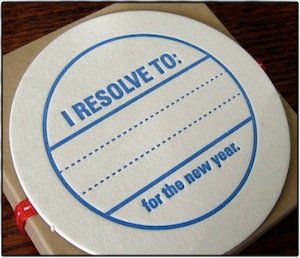Here we are in the first week of 2013. This is the season for self-evaluation and reflection. For some of us, it’s the time to make New Year’s Resolutions.
A recent study done at the University of Scranton[note A quick summary of this very interesting study, including the top New Year’s resolutions made in 2012. http://www.statisticbrain.com/new-years-resolution-statistics/] found that 45% of Americans usually make resolutions each year, but only 8% of people who make resolutions stick with them. Only 8%! No wonder so many of us are cynical about New Year’s resolutions!
The study also found that people who explicitly make New Year’s resolutions are 10 times more likely to attain their goals than people who don’t. 10 times more likely! That’s huge. If you care about personal growth, this is something you have to take seriously. Making personal commitments like New Year’s resolutions can be a powerful tool for intentional living.
If you make resolutions, I’d like to help you make ones that will work and make a significant difference for you. If you don’t make resolutions, I’d like to offer a perspective that might change your view.

Your resolutions are likely to fail.
They don’t succeed or fail because of your willpower and ability. They succeed or fail based on how and why you choose them.
There are two reasons why so often we fail to stick with them. Today I’m going to share with you the first reasons. In the next post, I’ll share the second. The first has to do with identity. The second has to do with fruit and soil.
Who Is Making the Resolution?
In the study I mentioned above the top five resolutions people made are telling:
- Get Healthy.
- Enjoy Life.
- Spend Less or Get out of Debt.
- Get Organized.
The number one resolution? You guessed it:
- Lose weight.
Pretty common resolutions, right? But think for a moment about the kind of person making these commitments. This is someone who sees themselves as unhealthy, someone who does not enjoy their life. This is someone who is unhappy with their financial situation, or who thinks that their life is chaotic. It’s someone who thinks they are fat.
Those may be fair judgments, but they also could easily represent assessments made by people who aren’t happy with themselves, who feel that they don’t measure up. They compare themselves to others and decide that they don’t measure up. Their life would be better if only…
Things get worse when that attitude goes deeper. Some of us attach this feeling to our sense of belonging. If we don’t perform well enough or don’t measure up, then we won’t be accepted or included or loved. Some of us attach this feeling to our beliefs about God. If we don’t succeed, or work hard enough, God won’t love us or forgive us or answer our prayers.

Resolutions that Grow From a Negative Identity Will Fail.
Here’s the stark truth. If your starting point for a resolution is that you are “not enough,” it’s no wonder that you don’t follow through on your commitment. Your choices and motivation flow from your sense of identity. If your identity tells you that you must perform in order to be acceptable, performance becomes a never-ending treadmill that will eventually undermine your health, emotions, and spiritual journey.
- If you’re making resolutions this year in order to be better than someone else, it’s probably not going to work for you.
- If you’re making resolutions because you’re unhappy with yourself and you hope that by changing some outward characteristic, you can fix that, it’s not going to work.
- If you want to get serious with your Bible, or prayer, or be a better, more spiritual person, because you believe that you have to earn your place with God, it’s just not going to work.
Start Instead with your Identity in Christ.
The Bible starts in a different place. I am a sinner, the Bible says. I fall short of God’s plan. I’m full of pride and selfishness. I’m desperate to save myself. This is true of me. It’s also true of you. In that sense, we are not enough. Not enough to earn our own salvation. Not enough to save ourselves.
But as a follower of Jesus, that is not your identity. You were created in the image of God, made good. You died with Christ and were raised with Him. If you’ve accepted God’s offer through Jesus, then you are healed. You are forgiven. You are a new creation. You are a priest and an ambassador. You are no longer in darkness.
Ephesians 5:8 makes this point:
For you were once darkness, but now you are light in the Lord. Walk as children of light—for the fruit of the light results in all goodness, righteousness, and truth— discerning what is pleasing to the Lord.
You have a new identity. You were once in darkness. But that’s not who you are anymore. Now you are light. That means you can live differently. You can walk as a child of the light. Your life can exhibit the fruit of goodness, righteousness and truth. This is what God says is true about you.
Now consider for a moment: If you started in that place, with that identity, what kind of resolution would you make?
Probably not a resolution to fix something bad about yourself, or to somehow measure up. You might choose a resolution to live as a child of light, to really experience your identity in Christ. And not because you have to or you ought to, but because you really get who you are to God. Any resolution that grows out of that understanding, you are much more likely to keep.
You are much more likely to follow through on resolutions that inspire you rather than condemn you. You will invest time in goals that grow out of a positive vision of who you are than a negative story about your failures and weakness.
Here’s the crazy thing. For followers of Jesus, this isn’t just something we make up. This isn’t just Positive Mental attitude. The Bible is so clear. Once we have accepted Jesus as our guide and savior, we have a whole new identity.
We are sinners, True. But we are sinners saved by grace. We are daughters and sons in God’s family. We are no longer servants, but now we are friends. We are loved, we are healed, we belong, we are a new creation. Does that move you?
Resolutions that come out of that identity, that are about experiencing that more, living it out more, those will inspire you and motivate you.
In my next post, I’ll share the other reason your resolutions are likely to fail. But for today, consider what identity your resolutions are coming from. Are they a response to a sense of being not good enough, or not acceptable? Or are they an inspiring commission to live out your beautiful identity in Christ?
Question: Do you make resolutions or not? How has your sense of identity shaped the resolutions you’ve made?
Note: You can catch an expanded version of these thoughts, along with historical and Biblical background in this presentation. January 5, 2013: “Two Reasons Why Your Resolutions Fail”
